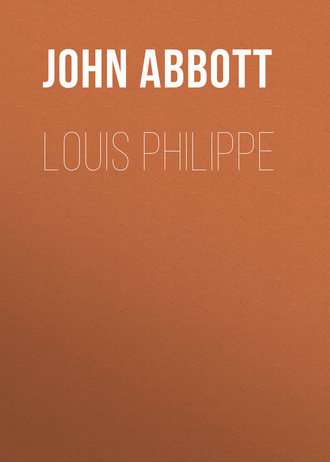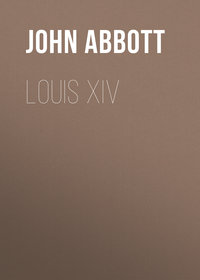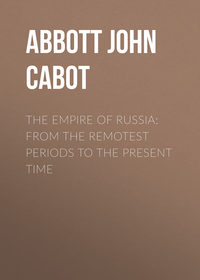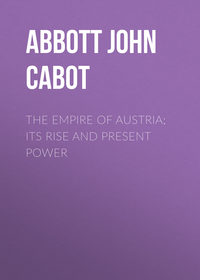
Louis Philippe
Vast amphitheatres bloomed with flowers in Eden-like profusion. The immense colonnades of the Palais Royal were crowded with orange-trees, whose opening buds filled the air with fragrance, and whose clusters of golden fruit enhanced the beauty of the scene. The spacious roofs and rotundas of glass sparkled with thousands of wax-lights, creating a spectacle so gorgeous and glittering that even those who were accustomed to royal splendor were reminded of the enchanter's palace in Oriental fable.
The marriage of the Duke de Berri, the son of Charles X. with Caroline Mary, niece of the Duchess of Orleans, had produced some reconciliation between the Bourbon and the Orleans branches of the royal family. The king and his family this evening, for the first time, in regal state visited the Palais Royal. As the duke was receiving the congratulations of his guests upon the marvellous splendor which the palace presented, thronged with courtiers sparkling with jewels and decorated with all the costly and glittering costumes of the old régime, one of the guests, M. Salvandy, shrewdly observed to the duke,
"It is, indeed, quite a Neapolitan fête, your highness, for we dance upon a volcano."
Striking remarks of the Duke of Orleans.
The duke with some emotion replied, "That there is a volcano here I believe as firmly as you do. But I know that the fault is not mine. I shall not have any occasion, hereafter, to reproach myself for not having endeavored to open the eyes of the king. But what could be expected when nothing is listened to? God only knows where all this will end – I certainly do not foresee what is about to happen. I can not tell where all those who are producing this state of things will be in six months hence; but one thing I do know, which is, where I shall be myself.
"Under all circumstances or changes which may occur, my family and myself will remain in this palace. This is our throne. Whatever may be the peril of so doing, I shall not move from the home of my fathers. I shall never again consent to separate the fate and fortune of myself and children from those of my country. This is my unchangeable determination."
One of the saloons contained two very fine paintings of Montmiral and Champ-Aubert, two towns in France in which Napoleon, heroically struggling against dynastic Europe combined in arms against him, signally defeated and drove back the Allies. The duke, being asked why he allowed paintings commemorative of the victories of the Empire to hang upon his walls, replied, "Because I like every thing French."
Complaints against the crown.
Soon after this the popular complaints against the crown became so general, so bitter, and the excitement so great, that the king, by the advice of the ministers who governed him, issued several ordinances which were regarded by the people as so despotic, as so subversive of all popular rights, as to call for resistance by insurrection and the force of arms.
The fatal ordinances.
The first of these famous ordinances suspended the liberty of the press, and prohibited the publication of any journals excepting such as were authorized by the Government.
The second dissolved the new Chamber of Deputies, or Legislature, because the members were too liberal in their political opinions, assuming that the electors had been deceived by the popular clamor, and had chosen such persons as they ought not to have chosen.
The third reduced the number of deputies from three hundred and ninety-five to two hundred and twenty-eight, and so altered the electoral franchise, in order to secure the return of members favorable to the Government, as to deprive a large number of the right of suffrage who had heretofore exercised it.
Such, in brief, were the ordinances which overthrew the throne of Charles X. and drove the elder branch of the Bourbons into exile. There were others issued at the same time, but which were of no material importance.
Frivolous as was the character of Charles X., he had sagacity enough to know that such decrees could not be issued in France without creating intense agitation. His ministers also, though the advocates of the despotic principles of the old régime, were men of ability. They recognized the measures as desperate. Popular discontent had reached such a crisis that it was necessary either to silence it by despotic power or yield to it, introducing reforms which would deprive the ministers of their places.
Character of the ministry.
Prince Polignac was at this time prime minister. His mother had been the bosom-friend of Maria Antoinette. Through his whole life he was the unswerving friend of the Bourbons. Implicated in the plot of Georges for the overthrow of the First Consul, he was condemned to death. Napoleon spared his life, and finally liberated him, upon which he followed Count d'Artois (Charles X.) into exile. Returning with the Bourbons, in the rear of the Allied armies, he was rewarded for his life-long fidelity to the ancient régime by the highest honors.
The sorrows of life had left their impress upon his pensive features. He was well-read, very decided in his views that the people were made to be governed, not to govern. He was energetic, but possessed of so little worldly wisdom that he thought that the people, however much exasperated, could be easily subdued by determined action.
M. de la Bourdonnaye, Minister of the Interior, like Polignac, was an ultra Royalist. He had been one of the most violent of the Vendéans in their opposition to the Revolution, and is represented, even by those who were in sympathy with him, as wishing to govern by a royalist reign of terror.
M. de Bourmont.
M. de Bourmont, Minister of War, had been a staunch Royalist in the days of the Revolution, struggling with the Vendéans in defense of the monarchy. Upon the establishment of the Empire he gave his adhesion to Napoleon. Being a man of ability, he was placed in responsible posts. At Waterloo, upon the eve of the great struggle, he deserted to the Allies, carrying as his peace-offering the betrayal of the emperor's plan of campaign. It is supposed that his testimony against Marshal Ney sealed the fate of that illustrious man. The French people had not forgotten his defection at Waterloo, and he was exceedingly unpopular.
These were the prominent ministers. The other members of the cabinet, though men of ability, were not of historic note. The original appointment of these ministers, whose opinions were so obnoxious and well known, had caused great indignation. The liberal press assailed them with vehemence. The Journal des Débats, after announcing the names of the ministers, exclaimed:
"The emigration of M. de Polignac, the fury of proscription of M. de la Bourdonnaye, desertion to the enemy in M. de Bourmont – such are the three principles in the three leading persons of the administration. Press upon it. Nothing but humiliation, misfortune, and danger will drive it from power."
M. Guizot was then editor of the journal Le Temps. He had already attained renown. His weighty editorials, distinguished alike for cogent argument and depth of philosophical thought, carried conviction to the most intelligent minds. M. Thiers was editor of the Nationale. His great abilities, already developed in his "History of the French Revolution," had given him a commanding position among the journalists on the liberal side. Both of these distinguished writers, and many others, assailed the ministry with such popular effect, that it was clear that their utterances must be silenced, or the ministry must fall. Hence the Ordinances were issued.
Dramatic scene.
The scene at the signing of these ordinances is represented by Lamartine as quite dramatic. The important measure of the coup d'état was anxiously discussed under the pledge of secrecy. The project of the ministers was cordially approved by the king. He is reported to have said:
"It is not the ministry, it is the crown, which is attacked. It is the cause of the throne against revolution which is at issue. One or the other must succumb. I recollect what occurred in 1789. The first step my unhappy brother, Louis XVI., made in retreat before the revolutionists was the signal of his ruin. They, too, pretended fidelity to the crown, and demanded only the dismissal of its ministers. He yielded, and all was lost. Gentlemen, I will not dismiss you. No! Let them conduct us, if they please, to the scaffold. But let us fight for our rights; and if we are to fall, fall sword in hand. I had rather be led to execution on horseback than in a cart."
Charles X. and his ministers.
On the morning of the 25th of July, 1830, the king and his ministers met at the palace of St. Cloud to sign the fatal ordinances. They all seem to have been in some degree aware of the peril of the step. Many of them had passed a sleepless night, and were deeply impressed with the solemnity of the occasion. They sat pale, silent, anxious, as Prince Polignac slowly read the ordinances and presented them to the king for his signature. Charles X. took the pen, turned pale, and for a moment hesitated. Then raising his eyes to heaven, as if imploring Divine aid, he said, "The more I think of it, the more I am convinced that it is impossible to do otherwise than I do." With these words he affixed his signature to the document which expelled him and his dynasty from France.21
Their unanimity.
The ministers, one after another, countersigned the ordinances. Not a word was spoken. "Despair," says Alison, "was painted on every visage." Polignac, in the temporary absence of M. Bourmont, was acting Minister of War. In reply to the inquiry what means of resistance the Government had in case of insurrection, he replied, with confidence equal to his self-deception,
"No popular movement is to be apprehended. At all events, Paris is sufficiently garrisoned to crush any rebellion and guarantee public tranquillity."
The antagonistic forces.
The force upon which Polignac relied consisted of 11,550 men in Paris, with twelve pieces of cannon. There were also fifteen battalions of infantry and thirty-four squadrons of cavalry stationed in towns not far distant, which could be rapidly collected to aid the troops within the walls. On the other hand, the city of Paris, in a general insurrection, could furnish 200,000 fighting men. Many of these had seen actual service. There was a National Guard, the militia of the metropolis, organized and well armed, consisting of 40,000 men. A portion of the royal troops, also, could not be relied upon in a struggle with the people. General Marmont, one of the marshals of the Empire, was in command of the Royalist troops. He was exceedingly unpopular in Paris, in consequence of the feeble defense it was thought he made when the city was captured by the Allies.
Issuing the ordinances.
The ordinances were secretly printed, and during the night of the 25th were placarded on the walls of Paris. They also appeared simultaneously the next morning in the Moniteur. Though some of the more sagacious had been suspecting that the Government might resort to measures of desperation, these ordinances took the whole community by surprise. Crowds gathered in the coffee-houses, at the doors of the public journals, and in all the prominent places of resort. There was no sudden ebullition of indignation, and no immediate demonstrations of violence. The event had come so suddenly that the masses were unprepared for action, and the leaders required time to decide whether it were best to attempt forcible resistance, and, if so, what measures to that end could most effectually be adopted. Though throughout the day no insurrectionary movements appeared, still agitation was rapidly on the increase, and Paris represented a bee-hive into which some disturbing element had been cast.
Risings of opposition.
The editors of the leading journals, and several others of the most illustrious advocates of liberal opinions, held a consultation upon the state of affairs. But night came, and the result of their deliberations was not made known. The day had been serene and beautiful, inviting all the population of Paris into the streets. The balmy summer night kept them there. Innumerable rumors increased the excitement, and it was evident that a few words from influential lips would create an insurrection, which might amount to a revolution.
The gentlemen who had met in conference – forty-four in number – after careful deliberation, and having obtained the opinion of the most celebrated lawyers that the ordinances were illegal, gallantly resolved to resist them at the hazard of their lives. They accordingly issued a protest, to which each one affixed his signature. The boldness of the act commanded the admiration even of the advocates of arbitrary power. In their protest they said:
"The Government has lost the character of legality which commands obedience. We resist it in so far as we are concerned. It is for France to determine how far resistance should extend."
Silencing the journals.
The liberal journals refused to take out the license the ordinances required. This act of defiance the Government met by sending the police to seize the journals and close their printing-offices. A commissary of police, with two gendarmes, repaired to the office of the Temps, edited by M. Guizot, in the Boulevard des Italiens. They found the doors barred against them. A blacksmith was sent for to force the entrance. This collected a crowd, and he refused to act in obedience to the police. A second blacksmith was sent for. As he commenced operations the crowd took his tools from him. At length, however, an entrance was effected, and a seal was put upon the printing-presses. This scene, occurring in one of the most populous thoroughfares of Paris, created intense agitation. Still, thus far, there had been so little commotion that the king and his ministers were quite sanguine that their measures would prove triumphant. Charles X. was so infatuated that on that morning – the 26th – he went to Rambouillet, and spent the day in hunting.
During the night of the 26th there was another very important meeting of the leaders of the liberal party at the mansion of M. Casimir Périer. About thirty were present. Nearly all were members of the Chamber of Deputies, and in intellectual strength were among the most illustrious men in France. Anxiously, yet firmly, they discussed the course to be pursued. It was a fearful question to decide. Submission placed France, bound helplessly hand and foot, under the heel of Bourbon despotism. Unsuccessful insurrection would consign them either to life-long imprisonment in the dungeon or to death upon the scaffold.
Diversity of counsel.
All agreed in condemning the ordinances as illegal. The more cautious hesitated at rousing the energies of insurrection, and submitting the issue to the decision of the sword. The young and impetuous advocated an immediate appeal to arms. While deliberating, a deputation appeared professing to represent the electors of Paris, and urged that, as the Government was manifestly resolved to support the despotic ordinances by force, nothing remained to the people but to have recourse to insurrection. It was also stated that nearly all the workmen from the manufactories were in the streets, eager to throw up barricades and to defend their rights at every hazard.
At the same time committees presented themselves from various bodies of young men, urging the deputies to take the lead of the patriotic movement in which the people were resolved to engage. Their solicitations were intensified by occasional discharges of musketry in the streets, and by the clatter of iron hoofs, as the king's cavalry here and there made charges to disperse threatening gatherings, or to prevent the erection of barricades. It does not, however, appear that any very decisive action was taken by this body. Late at night it adjourned, to meet again the next day.
The conflict in Paris.
The morning of the 27th revealed a scene of turmoil and agitation such as even excitable Paris had rarely witnessed. The king and his court, with twelve hundred of the troops, withdrawn from the city, were at St. Cloud. Large bodies of men were surging through the streets, apparently without leaders or definite object, but ready for any deeds of daring. Every hour of the day affairs were more menacing. Frequent reports were brought by the police to the ministers at St. Cloud, which represented that, though business was generally suspended, and there were agitated crowds in the streets, still no serious danger was apprehended.
Threatening aspect of affairs.
But General Marmont, who was intrusted with the command of the garrison in Paris, early in the morning became alarmed in view of the struggle which he apprehended was about to commence, and of the inadequate means under his control to meet it. In counting up his forces he found that he had not more than ten thousand troops within the walls. Of these not more than four thousand could be relied upon in a conflict with the people.
Well might General Marmont tremble. From the remote sections and narrow streets the populace were thronging to central points. The boulevards, from the Place de la Bastile to the Madeleine, presented a dense mass, whose angry looks, loud words, and violent gestures indicated that they would fight with desperation should the struggle once commence. Many of them were skilled in the use of arms. They knew how to construct barricades. Every house was a fortress from whose windows and roof the populace could hurl destruction upon the heads of the troops, wedged in the narrow streets. And General Marmont had reason to fear that of the small force under his command six thousand would fraternize with the people upon the report of the first musket.
The war-worn marshal skillfully arranged his forces, evidently copying the operations of Napoleon in his famous repulse of the attack of the sections upon the Convention. Three battalions were placed at the Carrousel, which might be regarded as a vast fortress in the centre of the city, walled in by the Tuileries and the Louvre. Three battalions were stationed in the Place de la Concorde, with two pieces of artillery. Three battalions of the line were ranged along the boulevards from the Place of the Bastile to the Madeleine. General Marmont did not wait for an attack to be made upon him. He sent out detachments to scour the streets and to prevent the erection of barricades. Reports had reached him that several were in process of construction in the most narrow streets.
Incidents of the battle.
The first barricade encountered was in the Rue St. Honoré, nearly in front of the Palais Royal. The troops endeavored to disperse the defenders by a volley in the air. As this produced no effect, they opened upon them with a point-blank discharge, by which several were wounded, and one man was killed. The other detachments met with no opposition, but removed several barricades, and dispersed tumultuous gatherings. The agitation was hourly on the increase. Random shots were heard in different parts of the city. The dead body of the man shot while defending the barricade was paraded in blood-stained ghastliness through the streets, exciting frenzied passions. The troops of the line, so called, who were known to be in sympathy with the people, and whom General Marmont distrusted, were received with shouts of applause wherever they appeared.
Fraternization of the troops and the populace.
Retreat of the king.
A vast concourse of the people had assembled in front of the Palais Royal. A detachment of the line was sent to guard the palace. The troops and the populace mingled together, talking and laughing. As the multitude pressed the troops, they opened their ranks and let the living torrent pass through, amidst loud cheers. Several armorers' shops were broken open, and it was manifest that vigorous preparations were going on in anticipation of the struggle of the succeeding day. Still the king, with an infatuation which is inexplicable, took no measures to add to the military strength at the disposal of General Marmont. Thus passed the day of the 27th. It seems that at night the king became somewhat alarmed, for at eleven o'clock he issued an ordinance from his retreat at St. Cloud declaring Paris to be in a state of siege.
During all the hours of the night of the 27th there reigned the calm which precedes the storm. The leaders of the Liberal party – among whom were to be found many of the most intelligent men, the wisest statesmen, and the most accomplished generals in France – had fully decided to submit their cause to the arbitrament of battle. Calm deliberation, organization, carefully matured plans, were requisite to meet the marshalled forces of the monarchy. It was no longer a mere street insurrection, but a kingdom was to be revolutionized. Immediately a new and tremendous impulse was secretly given to the movement. Committees were busy. Agents were active, invested with authority which the populace instinctively recognized without inquiring into the source from which it emanated.
With the early light of the next morning – the 28th – the result of the operations of the night was manifest. In the vicinity of the Place of the Bastile there is a portion of the city densely populated, called the Faubourg St. Antoine. It is inhabited by a class in a humble condition of life, who have ever taken a very prominent part in all the insurrections which have agitated Paris. Reckless of their own lives as well as of the lives of others, they have ever been the most desperate and the most dreaded fighters in every conflict in the streets.
All Paris in arms.
With the morning dawn the faubourg seemed to be swarming. Guided by some mysterious but common impulse, a huge and disorderly mass – ever increasing – of maddened men and equally maddened women, armed with swords, muskets, pickaxes, and every other conceivable weapon of offense or defense, surged along through the Rue St. Denis and along the crowded boulevards towards the Place of the Madeleine, which was occupied by the military. At the same time, at several important points along the boulevards, the people were busy – men, women, and boys – tearing up the pavements, seizing and overturning omnibuses and carts, cutting down the trees, pitching heavy articles of furniture out of the windows of the houses, and thus constructing barricades.
Triumph of the insurgents.
The points selected and the artistic style of structure indicated that military genius of a high order guided the movement. Only a small detachment of troops could be sent out from the central position at the Tuileries. As they could not be everywhere, the intrenchments of the populace rose in various parts of the city, unopposed, with inconceivable rapidity, and with almost military precision. Large bodies advanced simultaneously to the gunsmiths' shops, to the police stations and guard-houses, to the arsenal and powder manufactory, to the artillery dépôt of St. Thomas Aquinas; and the guns, muskets, and ammunition thus seized were freely distributed to the people. The National Guard, forty thousand strong, was thoroughly armed. The ranks of this formidable body were filled with the citizens of Paris, who were all in sympathy with the insurrection. Many of them appeared in the streets even in their uniform.
Success of the insurgents.
A band of armed men advanced to the Hôtel de Ville, where but sixteen soldiers were stationed on guard. The soldiers, attempting no opposition, withdrew unmolested. A huge tri-color flag, unfurled from the roof, announced with the peal of the tocsin that that important post, almost an impregnable citadel in the hands of determined men, had fallen into the possession of the people. The tidings swept the streets like a flood, giving a new impulse to the universal enthusiasm. A few moments after another band burst open the gates of Nôtre Dame, and another tri-color flag waved in the breeze from one of its towers; while the bells of the cathedral with their sublime voices proclaimed to the agitated yet exultant masses the additional triumph. It was scarcely midday, and yet four-fifths of Paris was in the undisputed possession of the insurgents, and, as by magic, from twenty spires and towers the tri-color flag spread its folds in defiance to the banner of the Bourbons. More than a hundred barricades had been erected, or were in the process of erection. Behind them stood more than a hundred thousand well-armed, determined men. With such rapidity and sagacity had all this been effected that there had been scarcely any collision worthy of notice. A few charges had been made by the gendarmery in dispersing crowds, and a few random shots had been fired.









